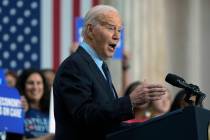Marijuana votes: A cue for Nevada lawmakers to act
Votes in Colorado and Washington state last week to legalize marijuana - not just for limited medical use, but full re-legalization - should light a fire under Nevada lawmakers to clarify this state's own legal regime for the ubiquitous plant.
The national sea change toward normalization also should trigger a re-evaluation of the approach of local law enforcement. As our chief law enforcement officer, the Clark County sheriff works for local voters and should be enforcing their will on such matters, not acting as though he and his men are mere native auxiliaries for a bull-headed federal government.
Nevada voters in 2000 ratified an amendment to the state constitution legalizing marijuana for medical use and instructing the Legislature to "provide by law for ... appropriate methods for supply of the plant to patients authorized to use it."
But to date, the Legislature has failed to heed that clear directive from voters, leaving the legal status of medical marijuana in such limbo that District Judge Donald Mosley - on his last day on the bench, earlier this year - condemned as "ridiculous" and "absurd" the current state of Nevada law.
As it stands, possession of an ounce or less of marijuana without a doctor's permission is treated as the equivalent of a traffic ticket in Nevada, says Kent Bitsko, director of the Silver State's own federal High Intensity Drug Trafficking Areas task force. But possession of more than an ounce remains a felony, which makes about as much sense as making it OK to possess a beer, but jailing the owner of any convenience store brazen enough to stock a six-pack.
"It is apparent to the Court that the statutory scheme set out for the lawful distribution of medical marijuana is either poorly contemplated or purposely constructed to frustrate the implementation of constitutionally mandated access to the substance," Judge Mosley wrote in a decision throwing out a drug trafficking charge against two men who had supplied the herb to patients unable to grow it themselves.
At this point, supposedly cash-strapped local police agencies including Metro continue to allocate manpower to bust dispensaries that attempt to meet the acknowledged medical need, and also to burn valuable fields of marijuana that could both supply such dispensaries and potentially generate millions of dollars in tax revenue. Southern Nevada police raided 146 grow houses last year, up from 138 in 2010 and 108 in 2009. That's up dramatically since 2007, when police staged 60 or 70 raids per year.
In other words, while providing nice photo opportunities, it doesn't seem to be working.
Not only that, a town as dependent on tourism as Las Vegas will hardly benefit from becoming known as one of the last places in America where a tourist can be strip-searched and jailed for doing something that's now considered perfectly acceptable back home in Seattle or Fort Collins.
Furthermore, taxed marijuana could bring in millions of dollars in revenue that otherwise is leaving the state or "going into the pockets of criminals," says state Sen. Tick Segerblom, D-Las Vegas, who proposes that Nevada follow the Colorado model, in which dispensaries can grow their own marijuana in tightly controlled rooms with video cameras.
Colorado plans to devote the potential tax revenue - estimated between $5 million and $22 million a year - to school construction, while Washington state would allocate pot taxes to an array of health programs.
It's clear public sentiment about marijuana has changed, says Beau Kilmer, co-founder of the Rand Drug Policy Research Center, a California-based nonpartisan think tank. According to the most recent Gallup poll, "More than half of the country supports marijuana legalization," Mr. Kilmer says.
How will federal agencies respond to last week's votes? Although President Barack Obama, who has acknowledged his own recreational history with illegal drugs, promised four years ago to respect state laws on medical marijuana and allow ailing patients with a doctor's recommendation to acquire and use the substance without fear, the counterproductive and violence-inducing drug war continues.
Nevada lawmakers - and law enforcement - must stop fighting the will of voters. Adopting some version of Sen. Segerblom's proposals make sense. If the Democrat can't win support for his bill in Carson City, the Nevada Supreme Court should order the Legislature to revamp the law in sensible accordance with the wishes of Nevada voters - albeit 12 years late.
"Thinking we're not going to have it is unrealistic," Sen. Segerblom says of recreational use. "It's just a question of how and when."

















